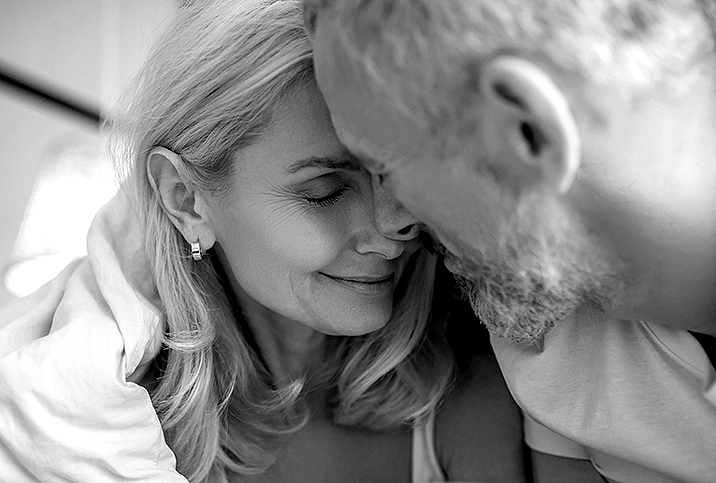Between the Pages: 'Man Overboard!' Offers Expert Advice to Aging Men

Informative, accessible and funny, the book "Man Overboard! A Medical Lifeline for the Aging Male" provides expert health advice for men in their 40s and older. Written by Craig Bowron, M.D., the book covers a wide variety of topics, including prostate cancer, heart disease, sleep, exercise, nutrition, low back pain and erectile dysfunction (ED).
Through 22 chapters, including "Rise Up, AARPathletes!" "Bald Is Beautiful" and "Testosterone Tales," Bowron guides men on eating right, exercising effectively, reducing their risk for heart disease, improving their sexual health and more.
Bowron is a board-certified internist and practicing physician. He works with first-year medical students at the University of Minnesota Medical School and trains residents at the internal medicine residency program of Abbott Northwestern Hospital in Minneapolis.
His writing has appeared in many publications, including Forbes, the Washington Post, Slate, Huffington Post and Minnesota Monthly.
In this interview with Giddy, Bowron explains his motivation for writing the book and why middle-aged men should make their health a top priority.
Editor's note: This interview has been edited for length and clarity.
Tell us about your approach to the book.
Bowron: Men are not stupid and we're not stupid about health. I do think when it comes to health, we're a little bit skittish and sometimes even kind of afraid of it.
Aging is complicated, but it's complicated for the different sexes for different reasons. Women, I would say unjustly, are held to a beauty standard. And for men, our standard is physicality. If you're diagnosed with kidney disease, it doesn't affect your beauty, but it could affect your physicality. If you develop heart failure, it's not going to make you less attractive, but it will hinder your physicality.
I think, in that way, aging is a different kind of order for men. It goes directly against the things we're judged by.
When I started thinking about writing for a public audience, I thought, "Why does medical information have to be so darn serious?" When you're writing something about health, you want to engage the reader. Oftentimes, health articles start out with something like, "Every year, 40,000 people die of eczema" because you're trying to get the reader in. I'm making that up, of course, no one dies of eczema.
Health is serious. My approach has always been to try to write in this particular voice like, "Hey, maybe you're not interested in hemorrhoids and maybe you don't have them, but I think you'll find this interesting."
My approach has always been to mix humor with medicine. I take medical information seriously. I don't take myself seriously. I think people are really tired of self-important doctors. People are tired of that "Sit down and shut up, and I'll tell you what to do" kind of doctoring.
There are no bar graphs and almost no bullet points. I wouldn't say it's a light read. There's a lot of serious information in here. But I tried to keep it moving. Part of what I've always enjoyed is trying to make complex things approachable and understandable. I don't think my patients need to understand atrial fibrillation on the level I do. But I do think they can understand what we're doing and why we're choosing the medications and procedures we are, while bringing them honestly into the discussion so they can participate.
Why do you think men are so bad about going to the doctor?
I'm a hospitalist. I don't do clinic work. What's interesting about being a hospital-based doctor is that when I have males in the hospital, it's a checkmate. There's no getting around the fact they're in the hospital with a health problem. They're in a very good place to get serious and say, "OK, I have not been taking care of myself since college, and this is what's happened."
In the book, I talk about the fear-focused approach to better health. Fear can sometimes be useful if it's based on facts. The facts are, by the time men get to their mid-40s, our mortality rate starts to climb rather quickly. The two most likely things that kill us, by far, are cancer and heart disease.
When you're in your mid-40s, the time for goofing around and abusing your body is drawing to a close. I'm not here to make decisions for you, but if you want to live a long and active life, it's time to get serious. As I say in the book, I don't like going to the doctor, either. I'm not making that up. I didn't write that just to empathize with my readers. I really don't.
I joke about "testosterone poisoning" and I think sometimes there's a testosterone receptor on the human invincibility gene that gets activated. We just think, "I am fine because I've been fine, so I will continue to be fine." And that's just not reassuring to anybody.
The book has a confessional tone because I think men need to get to the place where we're honest with ourselves and say, "I'm getting older. There are things I can do to slow that. And it's time to get serious."
Serious doesn't mean all at once. I think fanaticism fizzles out, particularly when it comes to health. It's like investing in the stock market. Plan. It's the steady investor that succeeds. By the time you get to your mid-40s, it's time to have a plan. What are the things that can be fixed and improved?
What are some steps men can take to improve their health?
If you smoke and you have to choose between smoking and ever seeing a doctor again, I'd stop smoking. I think you can do more for yourself than the medical system could ever do by removing that. Forget about everything else before you stop smoking.
Number two is extra weight. Extra weight is a primary driver of hypertension, which is a primary driver of cardiovascular disease and it's a primary driver of diabetes, which is also a primary driver of vascular disease. Everybody knows they should lose weight. We think mostly about extra weight as a cosmetic issue. Being overweight is not a cosmetic issue. The book has a very anthropological view. The question is: "Who were we meant to be?" Being overweight is not what we were designed to be. When we look at these studies of metabolism, it's like putting a banana in the tailpipe. The engine starts to chug. Lots of bad things happen.
The third thing is exercise. Activity is great. Exercise is better. We were not designed to be sedentary creatures. It doesn't mean you have to be doing 10Ks or triathlons. The weird thing about it is that we recommend exercise so emphatically and we still don't know what the magic sauce is, other than that it keeps us lean and that's a good thing.
No smoking, trim off the weight and be physically active.
You have a chapter entitled 'Sexercise.' When is it unsafe for an aging man to have sex? What are the cardiovascular demands of sex?
The "Sexercise" chapter came out of the ED ads that say as a disclaimer, "Ask your doctor if you're healthy enough to have sex." I went into the office and asked my partners if they knew the answer to that. "What do you do? A treadmill? Does that approximate the sexual act?"
There are not a lot of studies on the true cardiovascular demands of sex. The few studies basically show that physiologically speaking, it's less intense than it feels. As far as the metabolic equivalence, they put it somewhere between a light activity and a moderately vigorous activity. Researchers have found if you walk up two flights of stairs in 10 seconds, that approximates the exertion involved in sex.
What does that mean for men? It means there's a very, very small increase in heart attack risk in the two hours after sex because of a surge of adrenaline.
If you're having chest pain when you walk up a couple of flights of stairs, that's something you should be very aware of and talk to your doctor about. But if you're having sex and you're not having chest pain or anything like that, I think we've overhyped the dangers.
For most people, sex is not unsafe. Even when there is an increased risk of a cardiovascular event, it is very, very small.


















